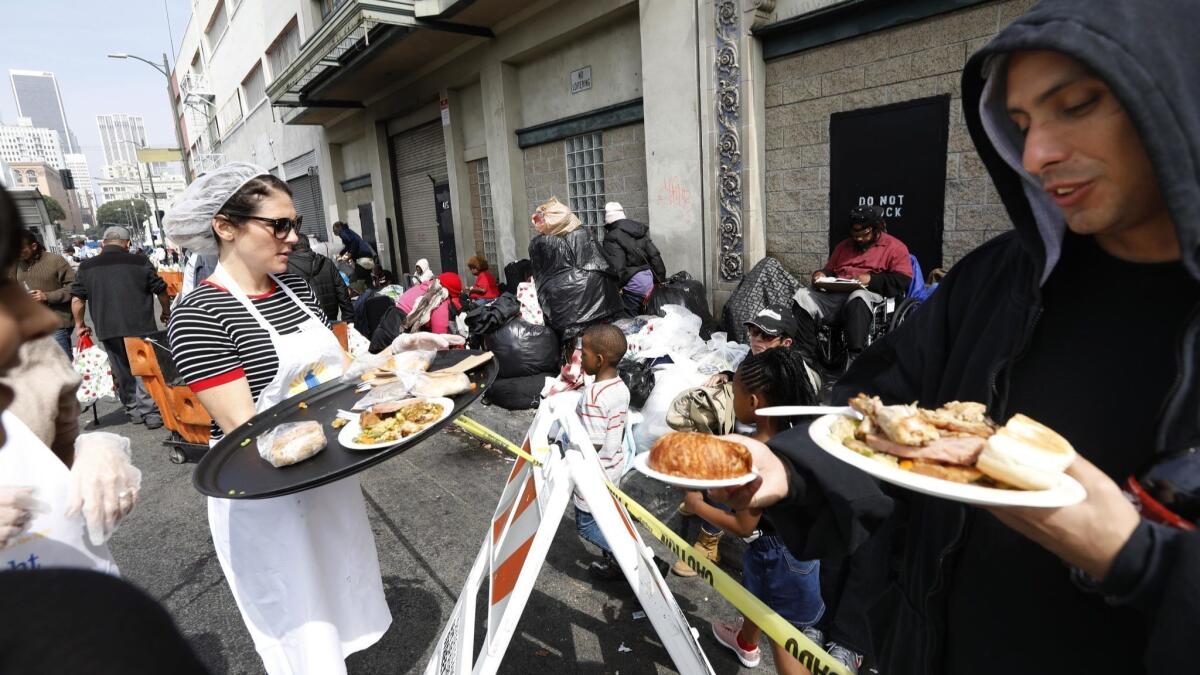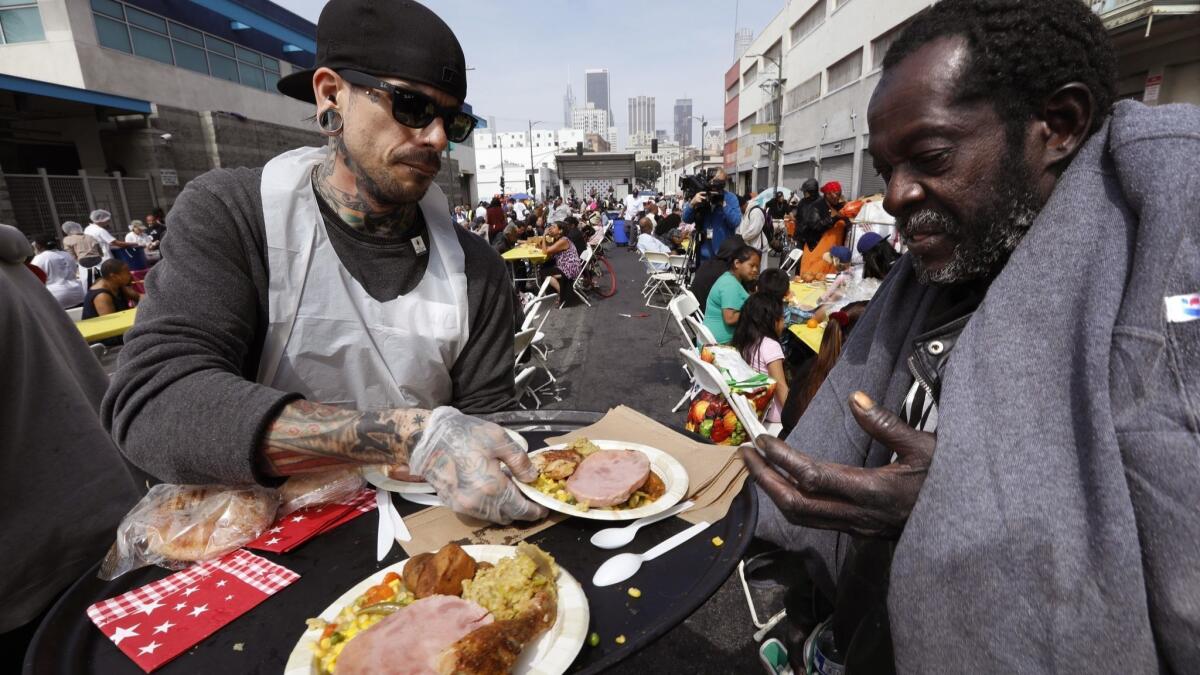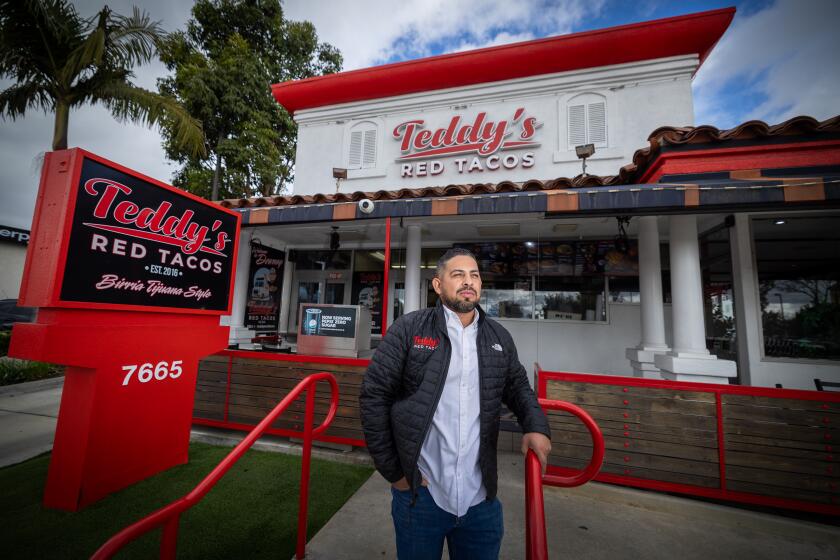Q&A: L.A. has tens of thousands of homeless, hungry people. We ask Midnight Mission how it helps — and how we can
- Share via
Los Angeles is in the midst of a historic homelessness emergency. While numbers may vary, it’s estimated California has about 134,000 homeless people — approximately 24 percent of the nation's total. Los Angeles County has the most within the state — at least 55,000 people, according to one audit. Centered in the skid row area of downtown Los Angeles, the Midnight Mission has been on the front lines of the homeless crisis since 1914, providing assistance to the homeless by offering paths to self-sufficiency, including access to shelter, clothing, medical care — and food. The mission is also a charity beneficiary of this month’s Food Bowl.
Recently, I spoke with Georgia Berkovich, director of public affairs for the Mission, about topics ranging from the crisis itself to misconceptions about homelessness and its causes, as well as how we can help.
This interview was edited for length and clarity.
What services does the mission provide?
One is immediate subsistence to any man, woman or child who comes through our doors, no questions asked. That includes three meals a day, every day. We serve almost a million meals a year. We have mail service, so you can send and receive mail here. We have a security desk that's open 24 hours, seven days a week where you can seek help. Maybe you need diapers for your children. Maybe you need a hygiene kit. Maybe you need a bar of soap, whatever.
We have a courtyard where we have restrooms and showers available to the community. We have the only restrooms in skid row that are open 24 hours. Our courtyard is equipped with heaters. We have a barber shop, a library and weekly art and music programs. That’s just immediate subsistence available to anyone. No questions asked.
Art is to the soul what food is to the body. It’s just as important, so we provide that as well.
— Georgia Berkovich, Director of Public Affairs, Midnight Mission
How are you funded?
We are funded by private donors. And we received grant money to open our women's shelter.
You also provide housing.
We have crisis and bridge housing for men and women. Maybe it's that they just need a hand up, to be connected with the right service. They need help getting rent for a month, kind of a simpler connection, such as our crisis housing. And then we have bridge housing which is longer, and that's [for] when people have a greater need and we're trying to connect them with services. Then we have our family living facility in Inglewood where we house homeless families, and that's a similar program to what we offer here in our recovery program.
Does the mission adhere any particular philosophy?
All of our programs are based on the 12-step philosophy. Even if it's not about recovery, we still use that philosophy. We're not a religious organization, even though we have "mission" in our name. We believe that somebody who is in need of help needs something to believe in before they can get help, not the other way around. There are other organizations that work well for other people who have a strong faith, but you must believe in certain things to get the services. We just encourage people to find their own higher power, whatever that may mean for them.
Los Angeles is in the middle of a historic crisis with respect to homelessness right now. How is the mission addressing this?
As it has increased, so have our services. Last year, we opened a women's shelter, and the year before we opened the shelter in Orange County. We continue to expand our services because the reasons that people are homeless are so varied and there is not just one solution.

Look at the stats: In Los Angeles last year, over 14,000 people were housed, yet the homeless count went up 23 percent. What that tells us is that people are becoming homeless more quickly than we can get them housed. It's not just a government issue, it's not just a private sector issue, it is all of our issues — every single person's responsibility.
I have a family member who has struggled with homelessness. It happens so slowly; one minute everything's fine and then incrementally things happen.
There are people who never dreamed as a child that one day, they would be homeless. You don’t wake up homeless. What would happen is most likely, let's say you lost your job or you didn't have money. You’d go stay with some friends for awhile, but maybe you feel like you wear out your welcome. So you try staying in a shelter, but you have to be in by a certain hour and out by a certain hour, and maybe it's not working with you and your kid.
So maybe you think, “I’ll just stay in my car for right now.” But now your car is getting ticketed, and you can't pay the tickets. So your car is towed or maybe stolen. So you find a clearing and think, “I can put a tent here, we can stay here and then be close to where I can get meals for me and my kid.” And ever so slowly, you're having to lower your standards to meet the way that you have to survive.
It can be such a slow progression.
So now you're living on the street, you're staying up at night to protect your kid and maybe you need a little help staying awake. So now when the drug dealer comes by, before maybe you would have said no, but now you're saying yes because you need to stay up so you can sleep during the day to protect your kid.
Did the drug addiction come first or did it come as a result of being on the street and just looking for some kind of relief? Maybe you're doing things that you swore you'd never do, and it doesn't happen overnight.
And you have to want help to get it.
There was one guy who was in our courtyard for, gosh, it took something like two years for us to finally get him connected with housing. He was a victim of a home invasion robbery and could not stand to be enclosed; he had to be outside. You never know someone’s story.
So much of it’s about building trust.
A lot of the services are about establishing that trust. Having meals three times a day. We're here every holiday. We have art and music. With each of these programs or projects that we do, we try to build that trust.
It’s also about changing other’s perceptions of the homeless.
Some people will say, “Well, some people choose to be homeless.” And it may look like that when you come up to somebody on the street and you say, “Hey, I can get you into some housing. Do you want it?” and they say, “Go away.” It is not that they don't want housing. It’s that they've lost faith. They've lost trust. Maybe they've been made promises before. Maybe they're mentally ill, and they don't even know that there's a solution. You don't know what you don't know.
How can we help, and what are some misconceptions about homelessness you’d like to clear up?
Some people think, “I’ll go down to skid row, and I will take all my old clothes, and give them out of the back of my car.” That’s a really, really bad idea. First, because it's undignified for the people in the community, what ends up happening is people hand clothes out of their car and they end up being left in the street. They become rat nests and trash.
So much of the trash on the streets is from people who are trying to do the right thing.
— Georgia Berkovich
It's the same with serving food out of your vehicle. So people may make 300 peanut butter sandwiches or something and they'll serve them out of their cars. It's not safe for the person doing it or for the people coming to the car. The rush of people to the car can cause fights, and then you have to think about the trash you're leaving behind and the leftover food.
What do you recommend?
We suggest that people work with an organization, and it doesn't have to be ours. But people could come in and volunteer. Let’s say you want to make 300 peanut butter sandwiches. Donate them here, and we'll hand them out. We have a security staff, and we have a way we do giveaways for things such as hygiene kits or clothing. It’s a better experience for the people who are donating and it's a more dignified experience for the people receiving the services.

How can we volunteer?
We need help with events. We need help with meal service. We have an art program, a music program, so we need bands to come or just single musicians. You can hand out hygiene kits. We need canned food. People can do peer-to-peer fundraising and reach out on social media. We have an annual toy drive where we ask people to collect toys a couple of months before Christmas. And then also, if somebody has a passion, we try to turn that into something for them.
Is there anything out there about the issue of homelessness that hasn't received the attention it deserves?
Remember the individual story. We talk about the issue of “thousands in skid row.” You know, just remember that there are the individual stories I think are being missed. And the individual success stories.
The Midnight Mission: 601 South San Pedro Street, Los Angeles, (213) 624-9258, www.midnightmission.org, Instagram: @themidnightmission
Eat your way across L.A.
Get our weekly Tasting Notes newsletter for reviews, news and more.
You may occasionally receive promotional content from the Los Angeles Times.







